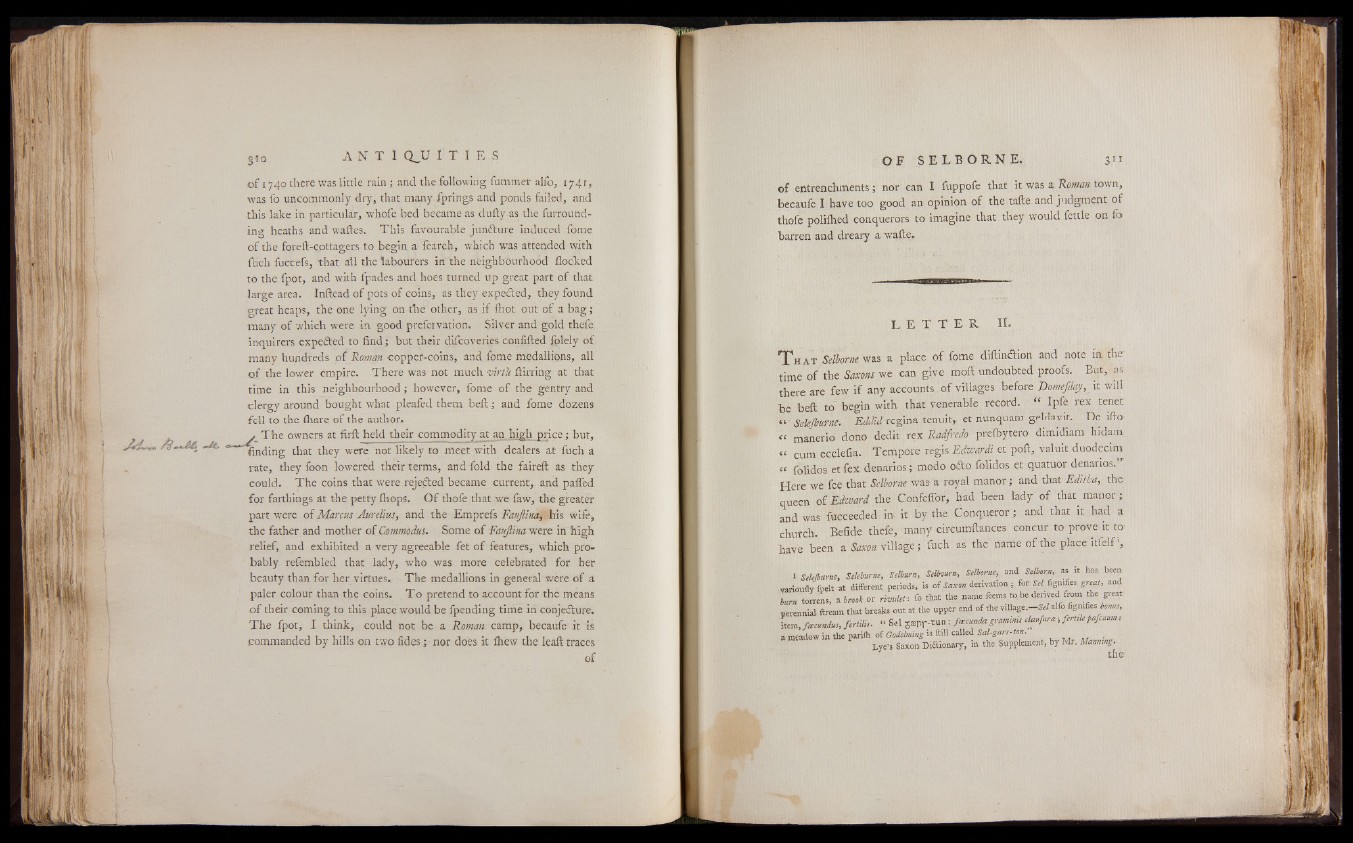
o f 1740 there was little rain ; and the following fummer alfo, 174 r,
was fo uncommonly dry, that many fprings and ponds failed, and
this lake in particular, whofe bed became as dully as the furrounding
heaths and waftes. This favourable jundlure induced fome
of the forelt-cottagers to begin a fearch, which was attended with
ftich fuccefs, that all the labourers in the neighbourhood flocked
to the fpot, and with fpades and hoes turned up great part of that
large area. Inftead of pots of coins, as they expedled, they found
great heaps, the one lying on the other, as if (hot out of a bag;
many of which were in good prefervation. Silver and gold thefe:
inquirers expected to find; but their difcoveri.es confifted folely of
many hundreds of Roman copper-coins, and fome medallions, all
o f the lower empire. There was not much -virtu Itirring at that
time in this neighbourhood; however, fome of the gentry and
clergy around bought what pleafed them b e ll; and fome dozens
fell to the lhare of the author.
, The owners at firft held their commodity at an high pric e ; but,
finding that they were not likely to meet with dealers at fuch a
rate, they foon lowered their terms, and fold the faireft as they
could. The coins that were rejected became current, and pafled
for farthings at the petty fhops. O f thofe that we faw, the greater
part were of Marcus Aurelius, and the Emprefs Faujlinajihis wife,
the father and mother of Csmmodus. Some of Faujlina were in high
relief, and exhibited a very agreeable fet of features, which probably
refembled that lady, who was more celebrated for her
beauty than for her virtues. The medallions in general were of a
paler colour than the coins. T o pretend to account for the means
of their coming to this place would be fpending time in conjedture.
The fpot, I think, could not be a Roman camp, becaufe it is
commanded by hills on two fides; nor does it ihew the lead traces
of
of entrenchments; nor can I fuppofe that it was a Roman town,
becaufe I have too good an opinion of the tafte and judgment of
thofe polifhed conquerors to imagine that they would fettle on fo
barren and dreary a wade.
L E T T E R II.
T hat Selborne was a place of fome didindtion and note in the'
time of the Saxons we can. give mod undoubted proofs. But, as
there are few if any accounts , of villages before Domefday, it will
be bed to begin with that venerable record. “ Ipfe lex tenet
“ Sehjburne. Eddid regina tenuit,- et nunquam geldavit. De iflo
* manerio dono dedit rex Radfredo prefbytero dimidiam hidam
“ cum ecclefia. Tempore regis Edwardi et pod, valuit duodecim
“ folidos etfex denarios; modo odto folidos et quatuor denarios.
Here we fee that Selborne was a royal manor; and that Edifha, the
queen of Edward the Confeflbr, had been lady of that^ manor;
and was fucceeded in it by. the Conqueror; and that it had a
church. Befide thefe, many circumdances concur to prove it to
have been a Saxon village; fuch as the name of the place itfelf5,
1 Selelburne, Seleburne, Selburn, Selbourn, Selborne, and Selborn, as it has bee»
varioufly fpelt at different periods, is o f Saxon derivation; for srf figmfies great, and
burn torrens, a brook.or rivulet: fo that the name feems to.be derived from the great
perennial ftream that breaks ont at the upper end o f the v illage.-«»/ alfo fignifies bonus,
item, facundus, fertilis. “ Sel 5 3epr ^ » n i f^undugramme claufura;fertileynfcuum-.
a meadow ill the parifli o f Godelming is ftill called Sal-gars-ton. .
l y e ’ s Saxon Diaionary, in the Supplement, by Mr. Mnnnmgth&